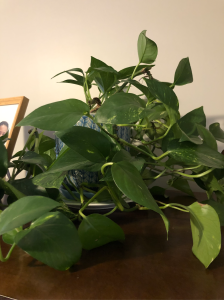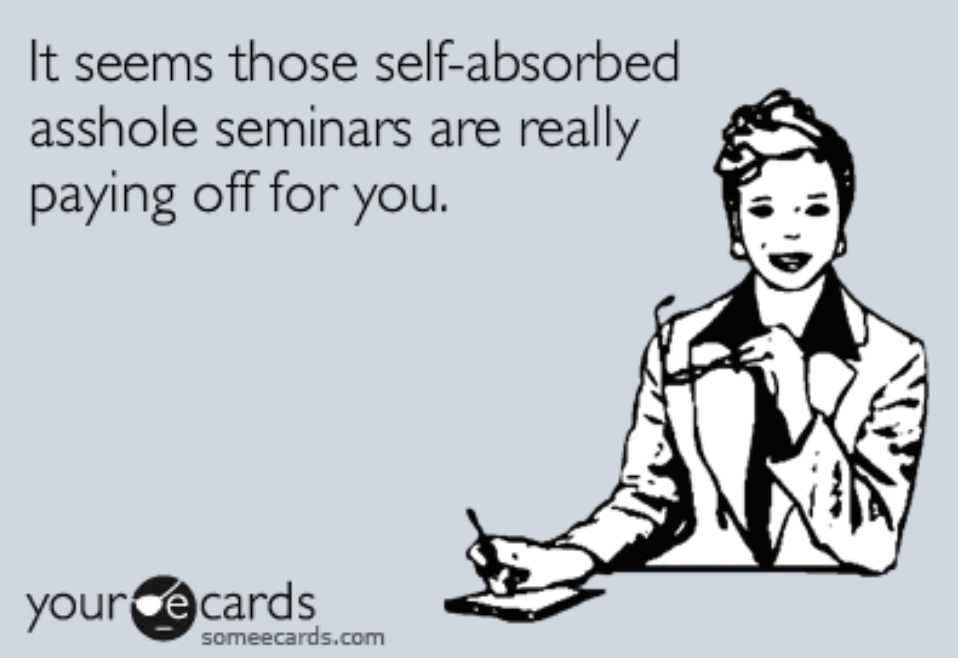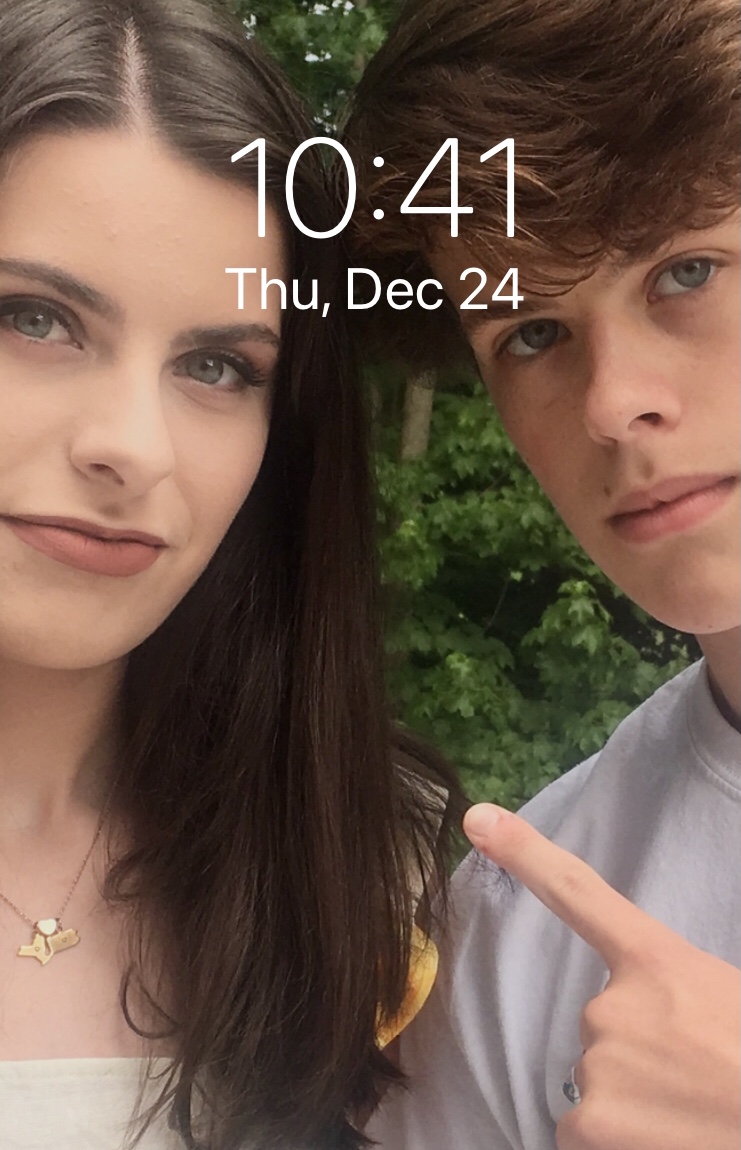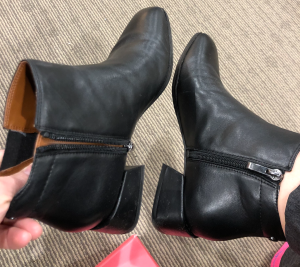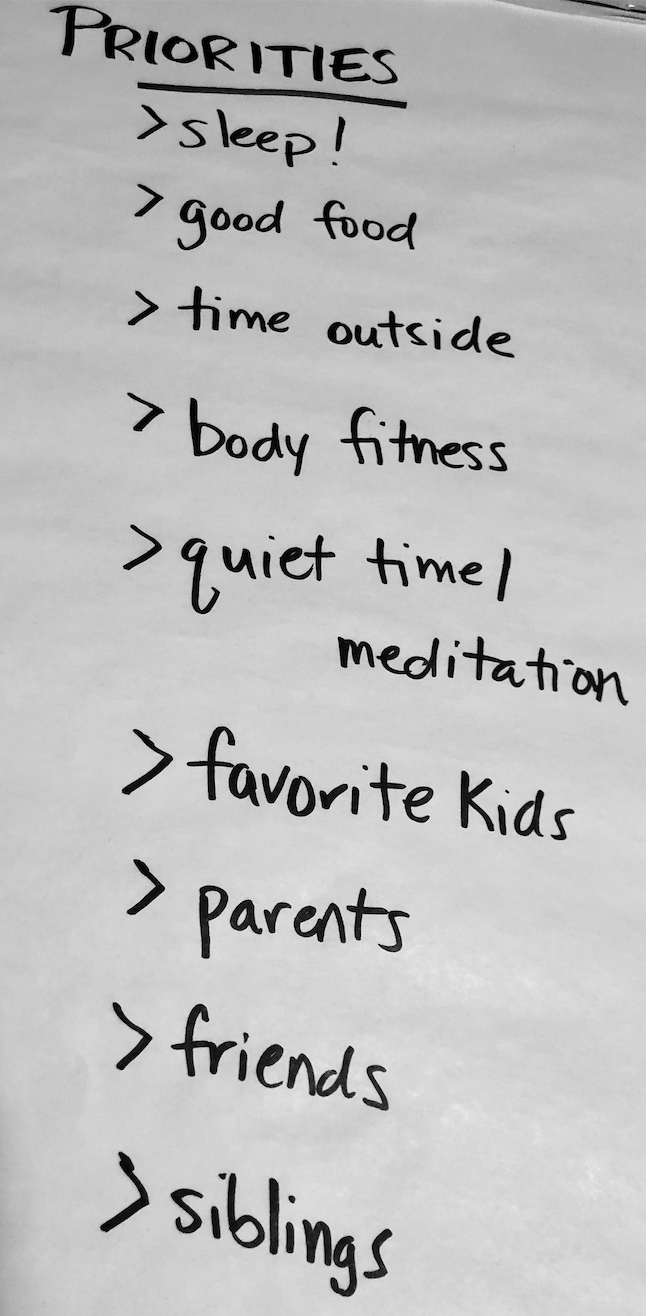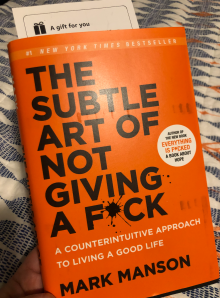Month: December 2020
#TheLaurieProject finale
I started blogging because I wanted to take stock of some ways I’ve been growing and things I feel good about in my life, and I wanted to do so as a kind of public conversation to acknowledge that we’re all figuring things out, moving forward, making headway. I’m not alone. Neither are you!
When I think back on the series of posts, I see 2 consistent themes…I just wrote them out, and then I decided it’s really just 1 theme so I put them together.
Pay attention; give time and energy to what matters.
Here’s what I wrote that seems to add up to that basic edict:
- an intro
- posts about routines that make my life better (partly by allowing time and energy to be spent on other things)—food and work outfits and writing and walking (“walking” is also included in the next category, and food really should be, too)
- posts connecting physical and emotional wellness—walking, dealing with lower back pain, and footwear
- posts reflecting on insights gathered from multiple venues—self-help books (here, and here, and here), AITA twitter, my son, a yoga class, and an election night dream
- a post about existential dread (lol; I just couldn’t figure out where this one belonged, so it got its own category!)
And now this post, bringing some (temporary) closure to the project. Note: I will probably add to #TheLaurieProject at some point when called to do so. It’s been a wonderful thing to work on.
***
I started making lists of things—things I’ve learned or value or believe or whatever. But it was feeling so general as to be meaningless. If I had to put some of it into words, which keeps pressing at me despite my generous use of the delete key:
I guess what matters to me is allowing a wide range of emotions, making time to play and create, connecting with others, taking care of myself, getting everyday shit done, being part of the wave of people in my election night dream who are there for others in ways big and small, and continuing to pay attention and be okay with messing up and trying to do better.
***
A list of some short-term goals
- make fitness (in addition to walking) a regular routine
- spend time with my kids doing activities we enjoy together (cooking with Callie? watching movies with Jace? brainstorm with them)
- try out the #DadInHistory project to see if that might be a good thing
- get to the tasks that keep moving to the procrastination pile (with a recognition that most of it is paperwork connected to finances, like completing the Fafsa)
- try out dating (mid-January, after the holiday season is over)
In the spirit of knowing that plans only become reality when you act on them, I’ve already taken steps on some of these. Others are on the back burner. But definitely on the stove top.
I will likely make meditation a part of my life at some point, but it’s not a priority for me today, so it’s not making the list.
***
I know 2020 has been a difficult year, and I don’t want to downplay that in these next sentences, but here’s my truth. I was a mess a year ago. I was in the middle of so many transitions that all I could do was keep moving forward, step after step after step.
I’m in a much better place now. I’m not completely together, and I don’t expect I will ever be able to make that claim, but I learned I am good at landing on my feet. I am gradually listening to myself, figuring out what I care about, and noticing my problematic habits and addressing those. I’m also beginning to move out of shame spirals and understand that we can do a lot of good even when we are still messing up and learning and messing up again.
That’s what I want to remember a year from now, when I will likely be facing new challenges. 2020 was not easy but it was an incredibly good year for me. It makes me look forward to 2021, not because I expect it to be better but because I want to see what’s next. I’m excited for my life, like a Netflix series I’ve been binging on. What will happen? How will the plot unfold? I don’t know. But I’m looking forward to finding out.
Thank you for reading. Thanks especially to those of you who have responded in some way. I’m glad we’re in this thing together.
one day after another after another after another
How do I feel by the end of the day?
Are you sad because you’re on your own?
The Beatles sing about getting by (and high!) with a little help from my friends, and that’s definitely true of me. (Well, I haven’t gotten high since my college days, but the night is still young.) These days, many of us are living in a socially distanced and sometimes lonely world.
It is not only the pandemic that makes my current life situation drastically different from anything I experienced prior.
For most of my adult life, time felt like a precious commodity that I just didn’t have enough of. My favorite pastime was reading and napping in the sun, a solitary activity of drowsy escapism. As my kids were growing up, if they fought or did something wrong while I was in the shower, they were in big trouble with me; I fiercely protected my 15 minutes of daily uninterrupted solitude. My favorite Mother’s Day was the year my husband took the kids out so I had a whole morning of gardening without anyone distracting me. Don’t get me wrong: I love my kids. Time to myself was just scarce. I appreciated every moment I got.
Work didn’t help. My first full-time faculty appointment began in fall 2005 when my kids were just turning 3 and 6. That first semester, I combined my professorship with administrative work, and I never stopped. I worked summers, weekends, weeknights, first thing in the morning, in the middle of the night when I couldn’t sleep, holidays, and while on vacation. I worked on my phone and on my laptop. I never pulled all-nighters as a student, but I did as a faculty person. I had trouble shutting off. When I had a stretch of open time, I felt obligated to be productive. There was always more to do. I could never fit enough into a day.
And now everything has shifted.
***
My 18-year old son lives with his dad, and I miss him terribly. We usually have dinner at least one weeknight, and he stays with me every other weekend, but he’s 18. That means he goes to school and works and socializes and spends most of his time away from me. This would be the case even if he lived with me full-time. Next year he’ll be going away to college and I’ll see even less of him.
My 21-year old daughter is living with me right now because of the pandemic and her university going fully online, so I get to see a lot more of her than I would otherwise. We have dinner on Mondays, and sometimes we spend time together on a weekend, but she’s 21. That means she goes to school and works and socializes and spends most of her time away from me.
Don’t get me wrong: I’m happy my kids are becoming young adults with lives of their own. It’s just that I suddenly have extra time on my hands. I feel like I’m living that Harry Chapin “Cats in the Cradle” song! lol…except I’ve actually spent a lot of time with my kids, so not so tragic.
And work, happily, doesn’t fill up my open time the way it used to. I shifted from a faculty-chair position with a lot of flexibility in my schedule to a full time administrator working Monday through Friday, 8:00-4:30. My prior “flexibility” meant I felt I should always be working since there was always more to be done. My current structured work schedule means that when I’m at work, I work; when I’m not at work, I don’t work. Sure, if there’s a special event outside of the typical work hours or something pressing that needs to be done, I gladly fill my responsibilities. But, in general, I have gaps of time in the evenings and on the weekends.
Now, instead of trying to fit more into the day, I find myself wondering how to fill the time I have. Some evenings, I find myself scrolling mindlessly through social media or playing a game on my phone that leaves me numb in body and mind. Some evenings I force myself to do one activity after another–wash the dishes, paint a picture, repot a plant, fold the laundry, paint my toenails, and on and on–in hopes that I can escape an overwhelming blah feeling. On two occasions I ended up on a dating app just to distract myself. For the record, I’m not against social media or dating apps or any of the other activities I’ve used to pass time. I even believe seemingly meaningless play is a wonderful thing and I plan on never giving that up.
But I am against frittering away my life, looking for something to fill some kind of void, building a suffocating cocoon of distractions. I’m still in the process of shifting.
***
I don’t have perfect answers for adapting to a changing sense of time. It presents a sort of existential crisis for me, along the lines of what is my purpose and time is running out and that feels paralyzing. And the surplus of time has also made me—a person who grew up in a big family and who has always been surrounded by other people—lonely. That’s at least part of what I’m coping with.
But I do, of course, have a few things I’m learning.
ONE: It helps for me to recognize and name feelings such as loneliness, grief, and anger. Instead of distracting myself from feelings, I’ve been trying to experience them. I spent a lot of years using work to distract myself, so I have some catching up to do. But I’m getting there.
TWO: Instead of asking myself “How will I fill this time?” I can ask myself, “What do I want to do with this gift of time?” The former question frames time as a problem, a challenge, something to slog my way through. The latter question presents me as an actor with interests and desires.
Too often, I’ve been passive, letting life happen to me instead of shaping my days according to my priorities (“Life is what happens to you while you’re busy making other plans“). I’m trying to pay attention to what I care most about. I want to use my time to reflect those cares. Note that this point is related to Mark Manson’s book, discussed here; it’s also something my friend Kelly said on the phone to me the other day, which brings me to my next point….
THREE: In the words of the Beatles, I get by with a little help from my friends. When I find myself engaged in mindless activity waiting for the minutes to pass with a terrible sense of blah, often calling someone–a friend or relative–gives me momentum to shift my mood or my activity. This blah feeling is different from feelings such as loneliness, grief, or anger because it seems stultifying; experiencing it makes me feel more stuck, whereas experiencing other feelings makes me feel more alive and free.
Just the other evening, I was wrapping gifts and ran out of tape. I had started with 4 tape dispensers, not realizing that they were all partial rolls, so the discovery was quite a blow when I finished the last roll mid-gift, as you can imagine. It would take me about 10 minutes total to drive to a drugstore and buy more tape. But that task seemed like WAY TOO MUCH EFFORT. Until I texted my good friend Lindsey about it. And then I went and bought some goddamn tape and about 17 other items I needed. It took about 20 minutes because of the extra shopping, and both my night and my week improved immensely. Thanks, Linds!
For real, sometimes the step that will break me out of a potentially blah empty evening is reaching out, not necessarily with any emergency call for help, but just a “hey, how are ya?” kind of conversation. I need to push that technique up to the top of my list of coping strategies.
FOUR: Sometimes it helps to focus on what I’m avoiding and why I’m avoiding it. Whole new worlds can open up. Before I started this blog series, I went over a month without blogging at all. I also had stopped watching TV. Each evening when I would consider what I wanted to do, those activities were quickly discarded. I was somehow never in the mood to do either.
Then I heard people talking about The Queen’s Gambit and I wanted to see it. As I watched the first episode, I realized that I had been avoiding blogging and TV watching because I didn’t want to sit on the couch where I usually sat for those activities. Why? Because I had lower back pain. I was avoiding enjoyable activities because they could be painful, but I was unaware of my motivation until that evening.
I found ways to sit that would be okay for my back, I began doing stretches and exercises while watching TV, and soon after I began blogging. Both activities are great for me–they help me process things and they are often just plain fun. As far as blogging: “It’s wonderful to be here. It’s certainly a thrill.”
When I talked with my therapist about this discovery, she said she was glad I had noticed sooner rather than later what I was giving up because of my instinct to avoid pain. She pointed out that sometimes I have a talent for avoiding pain, which in itself can lead to…a different kind of pain.
And that brings me back to item #1 in this list, doesn’t it?
***
That’s it. That’s what I got so far. I have time off December 25 – January 3, and I already had trouble sleeping one night, getting anxious about facing that time with options limited by the pandemic. In non-pandemic times, I think I’d travel to a beach for a few days where I’d be happy walking and reading and playing in the water.
I asked for ideas on Facebook, and I’m grateful for all who made suggestions. I will spend some time with my kids and spend outdoor time walking or hiking with friends. I have a couple social zooms planned, and I’m looking forward to taking care of some small projects. I’ll probably finish my #TheLaurieProject blog series, and I will likely get started on my next writing project. I’ll definitely read and watch some TV.
I’m not sure what else I’ll do, but I have a feeling the days will fly by. When I was in high school, I wrote this poem. I think it had a first stanza that I no long remember, but here is the middle and end.
The funny thing is clouds
which seem to keep quite still
while they easily pass over the grass
and beyond the furthest hill.
Who can count the years?
or the days or hours or minutes?
We hardly notice when they fly by
on wings of the swiftest linnets.
That’s PastLaurie teaching PresentLaurie to pay attention, to notice, to live. And when I find myself in a numb or mindless or blah state, to refocus on what and whom I care about.
writing
Even though I have always loved to read and write, for most of my life I was the kind of person who thought I should be keeping a journal. It wasn’t until summer 2018 that I actually went from someone who wrote in a journal sometimes to a person who keeps a journal (and you can read a bit about that here).
In July 2018, my journaling was a way to help me recognize all I was doing, which was important because my days were regularly full but I easily focused on all I had not accomplished. Journaling helped me organize my thoughts, plans, ideas, and schedule. It helped me take time to process. And it helped me give myself credit for the many tasks I was completing.
My writing evolved. When I was a faculty person, my work life and personal life blended together, so I kept one journal. Eventually, after moving to full-time administration, I needed separate journals for work and my personal life. Both journals combine the kind of deep engagement associated with reflection or grappling with difficult things and more rudimentary writing—to-do lists, notes, reminders. I dog ear pages I need to return to. I use Google Keep and white boards to help me keep an eye on bigger projects so I can make progress without feeling anxious about remembering everything. I take pictures of my journal pages chronicling grocery lists or errands before I head out the door.

The whiteboard at work helps me track projects so they don’t fall off my radar 
GoogleKeep helps me track tasks via categorized and color-coded lists 
I take pictures of journal pages with my phone to keep track of weekend errands and plans
When I go to therapy, I bring my journal with me. I usually don’t open it, but having it with me is a reminder of the questions and concerns and issues I’ve written about, the things I know I want to talk about, the parts of my life I need help figuring out.
I usually sit in my car at the end of a therapy session and write about what I learned. I have a good therapist; she reads my life and offers insights that are worth sitting with. I don’t often reread my journals, but I hold onto things more through the simple act of writing them. They become mine. Inscribed, if ever so lightly, on who I am.
I prefer spiral bindings and lined paper, but I will write in anything. I prefer pens that roll smoothly without bleeding through pages or smearing. I want my writing to be pleasurable. It’s not a chore. It’s not something I should do. It’s something I want to do. It’s a gift.
I have become someone who journals.
***
Back in 2010, I heard Bump Halbritter (that’s a great name, isn’t it?) speak at the CWPA (Council of Writing Program Administrators) Conference in Philadelphia. He said that if we want our students to write using new media, we needed to be using it ourselves.
I left that conference and began a video blog so I could learn how to make videos and how to blog. That first video blog was recreational, but it taught me a lot and influenced my teaching, my administrative work, and my scholarship in wonderful ways. I ended up creating lots of collaborative blogs over time, and you might enjoy some of the ones from classes I taught, like this one or this one or this one.
As you can see, I’m still blogging. (I’m actually still making videos, too, but that’s just a chance thing needed in my workplace because of the pandemic. I think I will always love editing video. But that’s slightly off-topic right now.)
In a lot of my blog posts, I chew on ideas in ways that are similar to my personal journals, but I spend time editing and reviewing and revising when I blog. The writing is informal, of course, and conversational, but I still take more care than I do in my journal.
Blogging has helped me take a lot of my personal stories and internal journeys and offer them up to others. It’s a humble kind of gift, one that I offer readers and that readers give right back to me by taking the time to listen. This is what happened to me or Here’s something I’m thinking through or I’ve learned something, maybe. I often don’t know the narrative of a blog post until I write it. I often write it too long and cut out chunks. I sometimes do very little editing or revision and just let a post out into the wild, warts and all. I’m often figuring out the journey right along with my readers.
Blogging helps me feel more connected, less alone. I’m someone who journals, and I’m also someone who blogs.
***
In the last several months, I have brainstormed and written tiny pieces of a novel. It’s something I would like to read if I ever get it written. It’s on the back burner for now.
Over many years, I have worked on a semi-scholarly book that I have plotted out and which I love thinking about but towards which I haven’t made serious efforts in quite some time. Academic writing takes a certain kind of sustained energy, and I may return to it in a focused way or I may dabble; I don’t know. That’s on a back burner as well.
And I have another writing project I hope to embark on soon. I don’t know yet how it will work, but it seems worth trying. Updates will come later.
I’m not sure what my point is except that different kinds of writing may or may not energize me and become part of who I am at different points in my life. As an academic, I have spent a good bit of time over the years writing for publication, usually for an audience of other academics. I’m happy with the work I’ve published; I worked to contribute to scholarly conversations that matter. But that is not what matters to me right now.
As far as this time of growth and healing and trying to process an unbelievable amount of change in my life in a very short time: Writing has meant everything to me. Publication is not the point.
Writing keeps me focused and organized at work, and it keeps me focused and moving forward at home. It provides a kind of buffer between the life I live / the actions I take, on the one hand, and, on the other hand, my intentions and plans and hopes and feelings in relation to the plot of my life. It creates room. It allows change and growth. It helps me see more clearly and listen better. It helps keep me honest.
Of all the things in my life that have been good for me, writing is right up there with food, sleep, water, and exercise. When I don’t know what to do with myself as evening falls, writing has helped me speak into the void, has helped me reframe the world, has helped me see myself anew by expressing myself anew.
I don’t really know what I’m doing. I don’t know where I’m going. But writing gives me a kind of stability, a pathway through the fallen snow that I shovel out with my pen (or with my keyboard? whatever…), one step at a time, allowing me to move forward rather than get stuck in the drifts.
I don’t know if that metaphor works, but it feels apt since I just did a lot of shoveling last week. That was some heavy lifting! And probably very good for me and my small muscles. It was hard, but it felt good when it was done and walking and driving became safer and easier. In this time of isolation compounded by a winter storm, shoveling opened up the world just a little bit; it made more things possible.
And, with that, I’m going to say it is indeed a good metaphor.
Shoes
For most of my professional life, I wore heels: strappy sandals in the warm weather, boots in the winter, occasional pumps. I stayed away from really high heels because they felt uncomfortable and I’ve tried to make it a rule that I only wear shoes I can run in if I have to.
Side note: I used to be so overcommitted that I did find myself literally running at times to avoid being late, mostly at the end of the day when I had to get to the bus stop on time. I look back and I want to intervene in PastLaurie’s life. But at least PastLaurie wore heels she could run in. She had that going for her.

On days when I wasn’t teaching, I often wore jeans or some casual outfit with a lower-heeled shoe, sandal, or boot.
I’ve never spent a lot of money on shoes, but I’ve invested enough to feel generally good about my footwear, and I usually think my outfits look better when I wear a heel.
But I just can’t do it anymore.
The shift happened gradually and then all at once.
Side note: Do you recognize that phrasing from Ernest Hemingway or from John Green? They both had characters making similar observations, but neither one was talking about a change in footwear.
I used to occasionally get foot cramps in the middle of the night, especially if I wore heels several days in a row. That was the shift away from heels that happened gradually; I simply wore them less often to avoid foot cramps.
Then, with the job I started in August and my long commute, I ended up using a standing desk for most or all of the day. I love it. It helps me stretch and move and minimize the time I spend sitting at work since I’m sitting over 3 hours a day in the car as it is.
But I can’t stand for over 8 hours in heels, five days a week, without both my feet and my lower back ending up in pain.
It took me approximately a week to realize as much. I thus experienced a sudden shift. The switch away from heels was relatively easy during temperate weather. It took a few days to get used to ballet flats, but just a few days. Then I started liking the look. My feet were happy, my back was healing, and I was as fashionable as I felt compelled to be.
Side note: I’ve never wanted to look like an academic. I appreciate the academic look in other people the way I appreciate a friend who has a country style going in her house; that is, it looks great, but it’s just not for me. I’ve gone more for an all-around-professional-woman-who-cares-enough-to-look-more-or-less-together-without-caring-so-much-that-she’s-over-the-top-in-any-way kind of look.
The shift to colder weather has been less gratifying. I’ve done okay. I already owned a low-heeled tall boot in brown. I have now purchased a low-heeled tall boot in black and ankle boots in black and camel. Both pairs of ankle boots have heels that are slightly high for standing all day, but they are still a gzillion times shorter than my typical ankle boots.
Side note: Or maybe the color of that second pair of ankle boots is caramel? How odd that the 2 words–camel and caramel–look and sound so similar, and they have similar colors associated with them, when otherwise they reference 2 extremely different things.
I think other low-heeled shoes might be possible, but I like to try shoes on because I can’t trust the fit will be right by size alone, so I avoid buying shoes online; my low-heeled options are thus limited to what I see on a shoe store outing. In my head, I keep imagining Oxford shoes, but I haven’t seen many, and none have made me excited yet.
I still own heels, but they’re now reserved for special occasions and social outings. They have not been used much during the pandemic!
I’ve mostly made my peace with this transition in my life. While I like the look of heels, it’s not a look I’m going to appreciate while I’m experiencing pain and hurting myself. I’m trying to listen to signals from my body and take care of it.
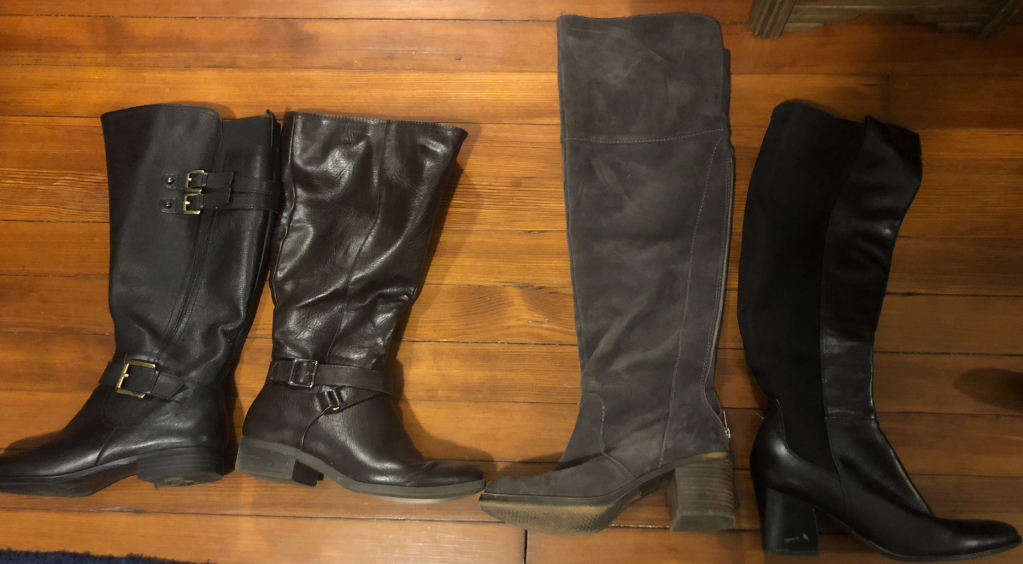
To phrase it another way: When I look in the mirror and see a person taking care of herself looking back, that person is way more attractive than when I look in the mirror and see a person who is hurting herself. That latter person may be trying to please others or may be making less-than-ideal choices for a whole host of reasons, and she is certainly not ugly because she’s wearing painful shoes, but she is…well, she just looks like she’s uncomfortable and on her way to hurting. Because she is.
Side note: I’m suddenly hearing these lyrics in my head: Take a good look at my face. You’ll see my smile looks out of place. If you look closer it’s easy to trace…the tracks of my tears. But most of the song doesn’t work here, just those lines.
This is one of a whole series of posts in which I’m not claiming authority or saying anyone else should make the choices I’m making. I am, however, owning where I am and what I’m doing. I’m sure I will continue to shift and evolve. Maybe FutureLaurie will view CurrentLaurie as overly extravagant and expending too much concern on appearance or morally corrupt for wearing leather, or maybe FutureLaurie will evolve in a completely different direction and become committed to high-end shoes. I dunno.
But as I walk–or run–into the future, I’m doing my best to do it with sole, to do it without being a heel, to toe the line only to the degree I want, and to appreciate what a feet it is to transition to flats after all these years. These final remarks may or may not be slightly tongue-in-cheek; I’m sure hoping they don’t fall completely flat.
AITA for finding wisdom in the comments?
I know. I know. I know. Don’t read the comments. But that’s not really accurate in SO MANY situations, amiright? And one of those situations, I would argue, is when it comes to Am I The Asshole? comments. I access AITA through Twitter, though it’s based on a Reddit account. And the wisdom I’ve found through AITA, well, it’s been freaking awesome.
Regularly, the OP (Original Poster) asks whether they have been an asshole based on boundary issues. The OP might ask if they’re an asshole for sleeping in their roommate’s bed, for telling their mother-in-law she needs to find another place to live, for refusing to do their significant other’s laundry, or for putting a giant penis decoration in the living room and refusing to discard it even though his mom says he should.
The stories themselves are sometimes absurd. That works, because life itself is regularly absurd.
The problem, for me, was that when I first started reading the posts, I had trouble deciding whether the OP was the asshole, or if someone else was the asshole, if everyone was the asshole, or if no one was the asshole. I could see most issues from each person’s perspective, and I often would feel bad for everyone caught up in a conflict. I had trouble discerning times when a person expected too much, or when someone was gaslighting (or being gaslit), or when someone was being persecuted for refusing to play the role of victim or rescuer.
Then I would read the comments, and they would offer clarity. Sleeping (uninvited) in a roommate’s bed is always inappropriate, whether the roommate is home or not. When the mother-in-law puts her feces on your kitchen table and consistently refuses to respect your personal boundaries, it’s fine to tell her she needs to live someplace else. If you and your significant other can’t figure out guidelines for laundry that work for both of you, why are you living together? While it’s your house and your choice about owning a penis decoration, maybe you could move it to the bedroom while your mom is staying with you.
Obvious answers, right? Well, the odd thing was that the answers often were not obvious to me at first. But as I continued to read the stories and the responses, I became better at discerning where people were crossing boundaries, putting unfair expectations on others, gaslighting, and persecuting.
I don’t read every AITA post, but I still read many, and each one is like a mini-quiz for me. Will I get the answer right? And then I read the comments to see whether my perceptions are sharp.
Shall we try one right now? Yes! We definitely should.
This experience was great–my 21-year old daughter is home, and the AITA story I found was about a 51-year old mom (my age!) forwarding a dick pic from an ex-boyfriend to her 22-year old daughter. The daughter got mad that her mom would send her such a thing, and the mom then got angry with the daughter and said the daughter was shaming her when she intended the pic to be something funny for them to laugh about together.
Who’s the asshole?
My daughter and I agreed: that mom is the asshole for disrespecting her daughter’s boundaries (and the boundaries of the guy who sent her the dick pic). And then the mom persecuted and gaslit the daughter when the daughter pointed out how problematic the mom’s behavior was. The daughter was not shaming the mom for being sexual or having human desires; she was shaming her for disrespecting the boundaries of their mother-daughter relationship.
And once I go to the comments, I see that internet wisdom has kicked in as it tends to do on this particular Twitter account.
Was that one too easy? Shall we try one more? Are you wondering how I could ever not know the answers? Yeah, I kinda am, too. But, as I told you, I’ve struggled with boundaries.
Anyhow. Here we go:
Some of the details are that the parent said they could put the plush lizard in the son’s room or in the car while the housekeeper was there. The housekeeper was okay with it being in the car, so that’s how the conflict was resolved. But the OP is still wondering if they’re being assholes because the housekeeper said that lizards are bad luck in her culture, so refusing to get rid of it (even when she offered more money than the toy cost) seemed racist and disrespectful of her culture.
My take on it before I read the comments is that the homeowners bought their kid who was into reptiles an appropriate gift, and they seem very willing to compromise when the housekeeper is around, so that seems like a solution that respects the differing cultures. Everyone’s needs are met. Everyone expressed their needs and desires to resolve the conflict. No one is the asshole.
Well, to some degree I can’t help but wonder if there’s some asshole behavior going on, but it’s hard to tell. The housekeeper told the parent that the child needs to learn that the child can’t always get what they want. That kind of remark seems odd in this situation: The child was receiving a gift and simply didn’t want to give up that gift. It’s not like the child was making a ridiculous demand. As a matter of fact, the housekeeper’s insistence that the plush lizard not be in the house when she is there is closer to an outrageous demand than a kid refusing to sacrifice a new toy.
So I’m going to say the housekeeper showed some assholery in her approach to the situation.
Now I’ll see what commenters have to say.
Commenters were less tolerant of the housekeeper than I was at first, though once I thought it through, I did come to the conclusion that the housekeeper showed some assholery. Some commenters were suspicious of the claim that lizards were such a big deal in the housekeeper’s culture, especially with this being a stuffed animal rather than an actual lizard. In additional conversations on Reddit, the OP was not excited about putting the toy in their car every time the housekeeper was there, so someone suggested putting it in the home office (the OP works from home). Many commenters thought the housekeeper was far out of line and thought it was time for a new housekeeper.
There you have it. Entertainment, online conversation, and good healthy boundary setting. AITA? Maybe I am, some days. But probably not from my habit of appreciating and learning from AITA Twitter thread comments.
from in-tension to intention: part 2 with Manson and Taylor
I recently wrote about reading two self-help books that speak to one another in rather cool ways:
Although I’ve only read a couple chapters in each, the first gem was a reminder to jump out of any shame spiral we find ourselves stuck in. I’m now continuing the conversation with a second gem.
Figure out what matters to you
I think all of our lives have felt less stable than usual in the midst of the pandemic. Mine was already in that state when the pandemic started. In addition to divorcing just over a year ago, I moved a few times in the past year and changed jobs twice. A year ago at this time, I was moving through tasks as well as I could, but I felt like I was falling apart. I could barely tell anyone how I was feeling because to speak of it at all was to break into outright sobbing, something I did several times in November and December of 2019. Since then, I’ve slowed everything down in my life because the changes were overwhelming and I needed to regain some footing. Now I’m at a point of slowly figuring out the shapes of my days. That’s why I’m blogging, really, to process the small structures of my days that prop up the big picture. I’m taking stock.
To be clear, in terms of the big picture, I’m still at an in-between stage of my life. I have settled into where I live and work, but I don’t necessarily know where I’ll be living or working in five years. And I also don’t know where my kids will be living and working in five years. I don’t know if I’ll be in a romantic relationship that will matter to me in five years. Of course, the future is never certain, so no one ever really knows where they’ll be in five years. Still, my future is far more open than I expected it to be at this stage.
That openness (instability?) in my life is one reason why I need to focus on what matters to me.
The other reason? Because I sometimes fritter away time, scrolling through social media or playing a game on my phone mindlessly. Sometimes I get lost on Zillow, imagining places I might eventually live. And at other times I waste time worrying about the future or imagining romance with Mr. Right (not his real name) or replaying and analyzing the past day or the past years or the past decades, wondering what other paths I could’ve taken.
Repeatedly, when I find myself a bit lost in such distractions, I’ve reminded myself of what matters to me so I can refocus my energy. This refocusing has been inspired and reinforced through the books of Manson and Taylor.
***
Despite his title, The Subtle Art of Not Giving a Fuck, Manson’s book is not actually about not giving a fuck but rather it’s about choosing what’s important enough to care about:
You and everyone you know are going to be dead soon. And in the short amount of time between here and there, you have a limited amount of fucks to give. (13)
It is thus “the most worthy struggle one can undertake in one’s life”: “to pick and choose what matters to you and what does not matter to you based on finely honed personal values” (Manson 13).
Taylor says something similar as she discusses bodies. One of the ways Taylor helps readers focus on what matters most is to delve into buying habits and distinguish consumerism that is based on fear and a sense of unworthiness from consumerism that is thoughtful:
When given the opportunity to think about how we would spend our money if we thought of it as a powerful and abundant resource…we choose things that bring us closest to the epicenter of our joy and remind us of what is central about being alive. (134)
Thus, “reflecting on our purchases gives us an opportunity to investigate whether we are in alignment with our own unapologetic truth” (Taylor 135).
How we spend our resources–our time and our money–can be random, unplanned, left to someone else to decide. Or we can be intentional in what we do with this “one wild and precious life” (to quote Mary Oliver).
***
I’m not going to say that I paid no attention to how I used my energy, my time, and my money before reading Manson and Taylor. But I will say that I didn’t give it enough thought. It’s only been recently, as I have put work into its place and as I have lived independently, that I have been called to articulate my priorities to myself. I’ve needed to.
Here’s one of my lists. You can see it’s all about self care and the people who matter most to me. (Hey, nephews and nieces and colleagues and former students and others who aren’t named here: You matter to me, too! I just ran out of paper. But don’t worry–my heart has plenty of room.)
This list is not my only list of priorities because I’m in the process of figuring things out. I care about the work I do, I care about helping others, and I hope to always make time in my life for play. The other day I felt crummy, and I didn’t devote time to what matters to me in any obvious way, but I did allow myself to feel crummy and to hunker down instead of forcing myself to move through my to-do list. “Feel crummy, lie around, and read until you fall asleep” is not on any of my lists, but I am committed to making room in my life for uncomfortable feelings, and I’m also committed to giving myself a goddamn break. (Did you notice? That was me avoiding the shame spiral. Woot!)
Being intentional isn’t about restricting myself. Instead, it’s freeing myself from the things I really don’t care about but somehow can get lost in. Being intentional gives me time and energy and money to spend in ways that I feel good about.
***
That’s it for today. What matters? And what choices are we making to reflect that? Those are the questions Manson and Taylor ask. Those are the questions I’m learning to ask and to answer, not only in the lists I make but also in the small and big decisions that give shape to my days and, over time, give shape to my life.
The subtle art of giving ourselves a goddamn break: A self-help gem
I was never a big self-help book fan. I get annoyed by the contradictory advice to accept ourselves and improve ourselves. And I also get irritated when the answer to everything that’s wrong is internal change. That just seems like the viewpoint of people who are comfortable enough in the world that they don’t have to worry about addressing structural oppressive practices that have (preventable) negative effects on people that no amount of self help is going to adequately address.
The irony is that I was a psychology major as an undergrad, I’ve benefited a lot from therapy, and I regularly do google searches for practical advice about my own behaviors the same way I might google search how to treat the stye in my eye or how far I can drive when a low tire pressure warning comes on in my car. How to actively listen to someone with different political views, best advice for parenting teens after divorce, healthy and unhealthy coping mechanisms, signs of narcissism, how to avoid the Karpman drama triangle, and so on.
I’ve also heard a lot about self help through podcasts: On Being with Krista Tippett, The Happiness Lab, Unlocking Us with Brené Brown, The Wellness Force, and more.
So, apparently, I like the self-help genre a lot more than I thought I did!
In today’s blog, I’m going to briefly connect two self-help books I’ve started reading. I haven’t finished either one, but I love the way they are speaking to each other. It seems worth sharing.
My good friend Ann Marie sent me a copy of The Subtle Art of not Giving a Fuck: A Counterintuitive Approach to Living a Good Life by Mark Manson, and I am reading The Body Is Not an Apology: The Power of Radical Self Love by Sonya Renee Taylor on my phone via Libby, the app that allows you to access digitized items from your library and which I highly recommend if you like to read or listen to audio books for free. I heard Taylor speak on a podcast, though I’m not certain which podcast since it was awhile ago.
I have read only two chapters in each book so far. But I’m pausing to share the gems before reading more.
***
Gem One: Jump out of any shame spiral you happen to find yourself in
Both books immediately address one of my irritations with self-help books–the tendency to advocate both self acceptance and change without acknowledging how paradoxical the two notions are.
Manson calls it “The Feedback Loop from Hell”:
We feel bad about feeling bad. We feel guilty for feeling guilty. We get angry about getting angry. We get anxious about feeling anxious. (Manson 8)
Taylor calls it “meta-shame”:
Our inability to get out of our shame story amplifies our feelings of inadequacy. Our presumed failure…becomes just another source of shame. (Taylor 121)
Manson’s remedy? Try saying to yourself:
Who gives a fuck? (8)
Taylor’s remedy?
Take a deep breath of kindness for yourself. (123)
Laurie’s remedy? I think I got this from my friend Jane (and possibly others): Notice your feelings. That’s it. Notice. Any time we spend judging our feelings is time wasted because feelings are not “right” or “wrong”; they’re just feelings. And they don’t last forever, so we might as well take some time to experience them.
Hey! Look at me feeling ashamed for feeling ashamed. Ain’t that something? Yup. That’s what just happened there. I felt myself cringe inside. That’s the way I feel sometimes. Yup. I sure do. (Laurie’s internal observation voice that’s experienced when it comes to noticing without condemning)
And here’s a corollary: We are worthy not in spite of the way we are broken but rather because of the ways we break and heal, break and heal, break and heal. So let’s give ourselves a break. Let’s allow ourselves to heal. Let’s value our imperfections and our growth instead of wasting time in a shame spiral.
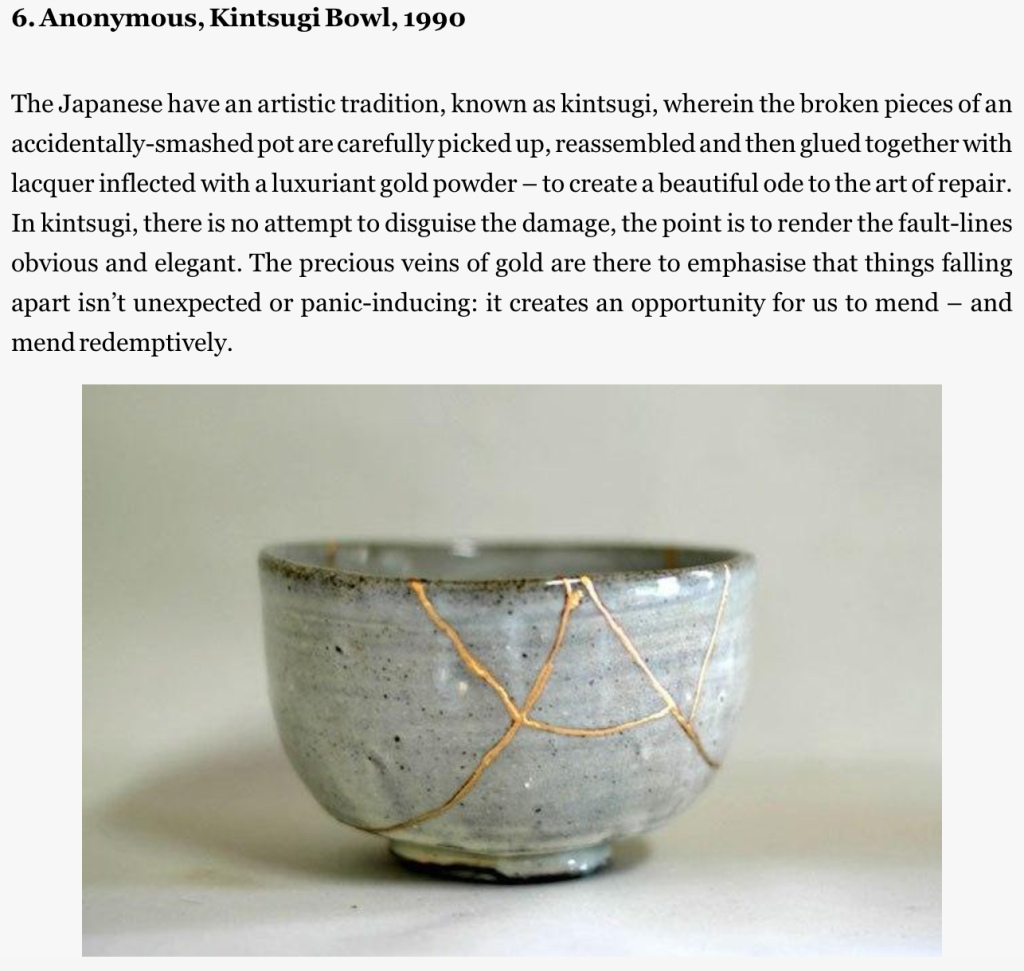
***
I was going to write two or three more sections, but I’m suddenly feeling like this is long enough. So that’s a single inspiration for now. That’s it. But it’s a good one, right? and I’ll have another gem from Manson and Taylor soon, so now you have something to look forward to.
No pain, no…change?
My lower back started hurting me almost immediately when I started my new job in August with a long commute. I adjusted the driver’s seat, activated the lumbar support, took ibuprofen, and waited to see if these small adjustments and time would make things better.
They didn’t.
By the end of September, I was miserable. My back hurt all the time, not just when I was driving. I felt such constant pain that I knew I needed to make changes; I knew I couldn’t live happily like that.
That moment. That’s what I’m interested in. When the signs are there that something’s gotta change…and when it takes more energy to ignore the discomfort than it does to stop, pay attention, take stock, and figure out a better way forward–even if the way forward isn’t easy.
***
I considered my options. How could I change the situation that resulted in not only discomfort but outright pain?
I liked my job and needed my job, so I knew that wasn’t going to change. My apartment is close to where my son Jace lives with his semi-retired dad, so I knew I wasn’t going to consider moving until after Jace completes high school. I had already put out some feelers to see if I might find a place to stay a couple nights near my job to cut down on the commute, but nothing was panning out.
In other words, avoiding or minimizing my commute was not something that was going to be feasible in the immediate future. But I also couldn’t continue with the kind of pain I was experiencing.
I thus took other measures. I moved forward with all of them at once. They took time and energy and forced me to figure some things out. But I didn’t really hesitate at this point, as September was coming to a close. I simply needed things to be different.
I booked a reiki session. My appointment was in early October. It was good in a soothing and meditative way. I don’t know how much it helped with my pain. But it was something that was healthy for me regardless: it was time when I surrendered, allowing myself to be cared for and healed through the processes of the reiki master.
I bought a bed with a good mattress to replace the kid-quality bed I had been settling with since splitting up furniture at the time of divorce. You know how there’s research that it’s experiences rather than things that increase happiness? I think that’s a false binary because sleeping on a good mattress is an amazing experience every single night. What a good purchase. The mattress arrived in early October and the bed came soon after.
I also bought a chifforobe, but that wasn’t connected to my lower back pain. It’s just a random fact I thought you might like to know. A chifforobe has drawers on one side and hanging space on the other. Now you don’t have to look it up.
I began physical therapy. My first appointment was the Monday after my reiki session, just after my mattress arrived. I was not good at follow through for the first couple weeks. But I slowly got better with stretching my whole body, strengthening my core, and committing to becoming more fit. I learned strategies for helping avoid pain while performing everyday activities. I was also motivated to use my standing desk even more of my work day and to continue making time to walk; the physical therapist told me these actions were what had already saved me from having worse pain, so there was no way I was going to sacrifice either.
I hadn’t been in a really regular fitness routine for a long time (and I could still do a lot more), but I have healed so much and feel so much better that I am motivated to continue the exercises and keep on building strength.
In short: My lower back pain was a catalyst. I ended up making lifestyle changes that are beneficial not just for my back but for my overall health, both in body and mind.
***
I wonder why it sometimes takes an experience of pain to instigate change. Why didn’t I take initiative to buy myself a good mattress as soon as I divorced? Why wasn’t I already committed to a fitness program that would have prevented my lower back pain? Why didn’t I immediately take serious steps when I had lower back pain instead of waiting for it to be severe?
As I look back at the first month of my new job, I understand the answer to that final question. I had a lot going on. I’m human, and I can only take care of so much at a time, so some things are prioritized while others…aren’t. And I was trying to figure out solutions, but it took time to figure out that my top solution (commuting less) was not going to work.
When I consider the question about why I waited to buy myself a good bed, a lot of the reason is simply because I’ve been really nervous about finances since divorcing. And I try to be low maintenance, avoiding any sense that I need a lot of stuff. A good mattress simply wasn’t important to me until I experienced serious discomfort.
As far as working out and being fit, I quickly blame myself, the same way I do for not meditating or developing other habits that I know would improve my quality of life if I began prioritizing them.
But that self-blame or shame thing seems like a waste of energy. Sometimes it’s just hard to change habits. Sometimes we go along feeling comfortable with our unhealthy habits until the chickens come home to roost. At that point, when comfort turns to discomfort, we switch things up. Or we ignore the chickens or try to shoo them away and only actually commit to action when those chickens are pecking away at our legs. Even then, we may try the easiest response and only put energy into a serious solution when those chickens have inflicted some damage and show no signs of stopping.
Pain–or the desire to avoid pain–can be a strong motivator.
***
I have more to say about my lower back pain and ways it’s positively affected me, helping me to pay attention and to make healthier choices. You’ll notice the theme returning in some future blog posts.
But for now, I’ll draw the conversation to a close.
I don’t fully believe in “No pain, no gain,” and I don’t think the proverbial “rock bottom” is necessary for change. But I am amazed that my response to my lower back pain was to first ignore it, second do the minimum to see if it would be enough for me to feel better, third to see if I could minimize travel, and only when the pain worsened did I make lifestyle changes that required time, energy, and commitment; and it was these changes that are incredibly good for me in ways that extend beyond my lower back.
Might it be an analogy for other kinds of discomfort and pain we face in our lives?
Nah. Probably not.
***
PS I’m a fan of chickens and don’t believe they’d peck at my legs, even though I enjoyed taking the idiom and thinking it through in a semi-literal way.





